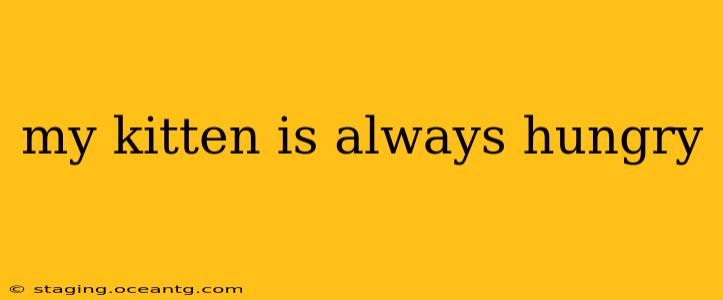Is your kitten a perpetual eating machine? Always hungry, always meowing for more? You're not alone! Many kitten owners grapple with this seemingly insatiable appetite. While a healthy appetite is a good sign, constantly wanting food can indicate underlying issues. Let's delve into the reasons behind your kitten's voracious hunger and how to address it.
Why Is My Kitten Always Hungry?
Several factors contribute to a kitten's seemingly endless hunger. Understanding these is crucial to ensuring your furry friend is healthy and thriving.
Growth Spurts:
Kittens experience rapid growth, particularly in their first year. This intense growth requires a significant amount of energy, leading to increased food intake. Think of it like a human teenager – they're always hungry because their bodies are working hard to develop. This is a perfectly normal reason for increased hunger.
High Metabolism:
Kittens have significantly faster metabolisms than adult cats. They burn calories much quicker, resulting in more frequent hunger pangs. This is simply a natural consequence of their youthful energy levels.
Breed and Size:
Certain breeds are naturally larger or more active than others. Larger breeds, for example, might naturally require more food to support their growth and activity levels. Similarly, highly active kittens will burn more calories than less active ones.
Food Type:
The nutritional content of your kitten's food plays a significant role. Low-quality food might lack the necessary nutrients, causing your kitten to feel perpetually hungry even after eating a large portion. Opt for high-quality kitten food formulated to meet their specific nutritional needs.
Worms or Parasites:
Internal parasites like worms can rob your kitten of essential nutrients, leading to increased hunger and weight loss despite eating frequently. If you suspect parasites, a vet visit is essential for diagnosis and treatment. This is especially crucial if your kitten is losing weight despite its appetite.
Underlying Medical Conditions:
In some cases, excessive hunger can be a symptom of an underlying medical condition such as hyperthyroidism (though less common in kittens), diabetes, or even certain digestive disorders. These conditions require veterinary attention.
How Much Should My Kitten Eat?
The amount of food your kitten needs depends on various factors including breed, age, activity level, and overall health. The best approach is to consult your veterinarian. They can provide guidance on appropriate portion sizes based on your kitten's specific needs. Following the feeding guidelines on the kitten food packaging is a good starting point, but always adjust based on your kitten's individual characteristics and your vet's recommendations.
My Kitten Is Always Hungry: What Should I Do?
- Consult your veterinarian: This is the most crucial step. A vet can perform a physical exam to rule out any underlying medical conditions and advise on appropriate feeding strategies.
- Choose high-quality kitten food: Ensure the food you're feeding is formulated specifically for kittens and contains all the essential nutrients for optimal growth and development.
- Feed multiple small meals: Instead of two large meals, try offering four to six smaller meals throughout the day. This can help regulate blood sugar levels and prevent excessive hunger.
- Monitor your kitten's weight: Regularly weigh your kitten to ensure they are maintaining a healthy weight. Sudden weight loss or gain warrants a visit to the veterinarian.
- Provide fresh water: Always ensure your kitten has access to fresh, clean water. Dehydration can sometimes be mistaken for hunger.
- Offer enrichment: Playtime and environmental enrichment can help distract your kitten and potentially reduce their focus on food. A tired kitten is often a less hungry kitten!
Remember, a constantly hungry kitten requires professional attention. Don't hesitate to schedule an appointment with your veterinarian to rule out any health issues and create a tailored feeding plan. Your kitten's health and well-being depend on it.
